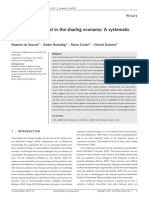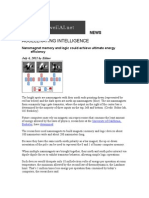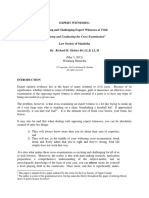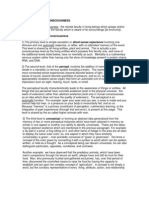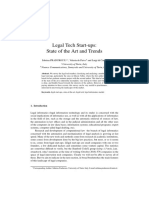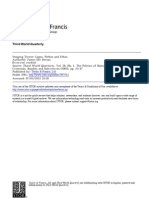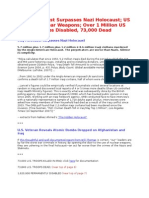0 ratings0% found this document useful (0 votes)
51 viewsIn Anthony Parel, Ed., The Political Calculus 209 (1972) Code C72c
In Anthony Parel, Ed., The Political Calculus 209 (1972) Code C72c
Uploaded by
marcoheliosWhile Machiavelli's writings provide some insights into politics through discussions of alliances and auxiliary troops, his model of 15th century Italian city-state politics does not directly correspond to contemporary global politics. Major differences include the introduction of nuclear weapons in 1945, which allow local wars but deter global conflict and change the concepts of power and military force. However, Machiavelli remains relevant in his analysis of human nature, which the author argues has remained largely constant over time in terms of passions and behaviors, despite changes in technology and geopolitics.
Copyright:
© All Rights Reserved
Available Formats
Download as PDF, TXT or read online from Scribd
In Anthony Parel, Ed., The Political Calculus 209 (1972) Code C72c
In Anthony Parel, Ed., The Political Calculus 209 (1972) Code C72c
Uploaded by
marcohelios0 ratings0% found this document useful (0 votes)
51 views11 pagesWhile Machiavelli's writings provide some insights into politics through discussions of alliances and auxiliary troops, his model of 15th century Italian city-state politics does not directly correspond to contemporary global politics. Major differences include the introduction of nuclear weapons in 1945, which allow local wars but deter global conflict and change the concepts of power and military force. However, Machiavelli remains relevant in his analysis of human nature, which the author argues has remained largely constant over time in terms of passions and behaviors, despite changes in technology and geopolitics.
Original Title
Machiavelli Today
Copyright
© © All Rights Reserved
Available Formats
PDF, TXT or read online from Scribd
Share this document
Did you find this document useful?
Is this content inappropriate?
While Machiavelli's writings provide some insights into politics through discussions of alliances and auxiliary troops, his model of 15th century Italian city-state politics does not directly correspond to contemporary global politics. Major differences include the introduction of nuclear weapons in 1945, which allow local wars but deter global conflict and change the concepts of power and military force. However, Machiavelli remains relevant in his analysis of human nature, which the author argues has remained largely constant over time in terms of passions and behaviors, despite changes in technology and geopolitics.
Copyright:
© All Rights Reserved
Available Formats
Download as PDF, TXT or read online from Scribd
Download as pdf or txt
0 ratings0% found this document useful (0 votes)
51 views11 pagesIn Anthony Parel, Ed., The Political Calculus 209 (1972) Code C72c
In Anthony Parel, Ed., The Political Calculus 209 (1972) Code C72c
Uploaded by
marcoheliosWhile Machiavelli's writings provide some insights into politics through discussions of alliances and auxiliary troops, his model of 15th century Italian city-state politics does not directly correspond to contemporary global politics. Major differences include the introduction of nuclear weapons in 1945, which allow local wars but deter global conflict and change the concepts of power and military force. However, Machiavelli remains relevant in his analysis of human nature, which the author argues has remained largely constant over time in terms of passions and behaviors, despite changes in technology and geopolitics.
Copyright:
© All Rights Reserved
Available Formats
Download as PDF, TXT or read online from Scribd
Download as pdf or txt
You are on page 1of 11
1
The Relevance of Machiavelli to Contemporary World Politics by Anthony DAmato, Chapter 9
in Anthony Parel, ed., The Political Calculus 209 (1972) Code C72c
THE DIFFERENCES
[page 209] No matter how well Machiavelli understood and expressed the machinations of city-state
politics in his day, his writings are at best an imperfect model of contemporary world politics.* There
are of course aspects in Machiavelli's model analogous to the present world, as well as features that are
irrelevant (fortresses, moats, weaponry). If one could say with assurance which aspects of Machiavelli's
writings are directly analogous to current politics, then one might learn something from his discussions of
alliances, the reliability of auxiliary troops, the calling in of external assistance for one's own internal
political problems, and other such insights. But the fact is that one must thoroughly understand
contemporary world politics before it is possible to say with assurance which aspects of Machiavelli's
model are relevant. In that case, there is not much further need for Machiavelli's model; it would only be
of interest to those who feel the need of praising (or criticizing) Machiavelli.
To an extent, of course, this is true of any theorythat to know whether the theory applies we have to
construct another theory. Nevertheless, the theoretical construction of a model of world politics may
help us gain insights into the real world to the extent that [page 210] we have confidence in the
correspondence of the features of the model to reality as we know it.
Machiavelli's model of city-state politics 500 years ago does not give us the degree of confidence
necessary for our acceptance of his trains of thought or his conclusions. This is not because the number
of his actors was small (five important Italian city-states plus France, Switzerland, Spain, and Turkey)
compared to the 120 nations today, but rather because of the fact that airborne nuclear weapons were
introduced in 1945 rendering nations permeable and summarily destructible. The mere presence of these
weapons in the hands of two superpowers necessarily distorts all other world power interrelationships.
Local wars today may look like the kinds of wars Machiavelli talked about, in varying degrees of
resemblance, but this is only because the major powers allow the wars to proceed as they do. In a
broader sense, we must ascribe to nuclear weaponry the fact that local wars since 1945 have indeed
remained local. The 'powder keg' of the Middle East would several times by now have erupted into
World War III were it not for the deterrence exercised by the two nuclear superpowers. It is also hard
to imagine that Vietnam or Korea could be the scenes of multipower participations within small
geographical limits except for our knowledge that vast nuclear destructibility lurks in the background
exercising, so far, a sobering and controlling effect.
Even the concepts of power and military force have changed dramatically since 1945. Although writers
such as Morgenthau, Thompson, and Kennan have articulated their neo-Machiavellian notions of power
politics largely since 1945, their own images had been cast firmly in pre-1945 reality. What they have
said about the primacy of military power and forcible containment has had slight correspondence with
the reality of the post-World War II era. In fact, military power has not been an important factor either
for national security or for aggrandizement for most nations in the past quarter century. Boundary lines in
Europe have remained almost precisely where they were in 1945 (including the troublesome and widely
2
considered 'unstable' situation in divided Berlin in a divided Germany). Both the Federal Republic of
Germany and Japan have increased their national 'power and GNP from the ashes of 1945 to positions
today exceeding their own pre-1939 inventories; this increase has been accomplished [page 211]
without war and without even the feeling that either nation is heading toward war or attempting to
provoke one. Perhaps the most dramatic example of the lack of utility of military force is the American
experience in Vietnam. The United States first threatened massive bombing of North Vietnam and then,
when the threats produced little if any change in the attitudes of Hanoi, actually carried out the threat,
dumping more tonnage into that tiny land than all the combatants used in all of World War II. The actual
bombing had, if anything, even less effect upon North Vietnam than the threat of bombing. The story
with respect to ground troops is even less impressive. By American statistics, which probably are
inflated with respect to enemy dead, it costs the United States well over one million dollars to kill a
single Viet Cong. Had the United States instead simply given that much money or purchasing power to
the Viet Cong, the war would probably have ended a long time ago, with many lives saved.
Military power has become a peculiar concept because of the existence of nuclear weapons. It seems
absurd for the United States to use expensive conventional weapons in Vietnam when the United States
is overstockpiled with nuclear weapons. This absurdity is not lost on the Vietnamese (nor on the
Koreans before them). Anything short of nuclear extinction is not a credible threat, nor is the threat of
nuclear extinction itself (as Secretary of State Dulles learned in 1954 when he called it 'massive
retaliation'). But if the terms 'force' and 'power' actually have different meanings and connotations today
due to the existence of the ultimate weapons, then Machiavelli's use of those terms is not isomorphic
with respect to our present theories of world politics. His model, in short, contains basic linguistic
divergences as well as empirical differences.
THE SIMILARITIES
Machiavelli's relevance to contemporary world politics lies in a different dimension: that of the
psychology of human behaviour. Despite the atomic bomb, we have a high degree of confidence in the
sameness of man today with the human model analyzed by Machiavelli. Although 'nature has given each
man an individual face,' Machiavelli [page 212] wrote to Piero Soderini, 'men do not change their
imaginings and procedures.' FN1 This theme forms a cornerstone of the Discourses. It is worthwhile to
study history, because history affords a basis for prediction. 'The affairs of the world ...are carried on by
men, who have and always have had the same passions,' and therefore it is not surprising that 'of
necessity the same results appear.' FN2
Before taking up the constancies of human nature in Machiavelli's writings that are of immediate
relevance to present-day world politics, let us consider briefly his theoretical-linguistic method.
Both for literary effect, and to exude an air of having comprehended all possibilities, Machiavelli
typically uses words in paired opposites. For example, speaking of the qualities which bring 'blame or
praise' to princes, he says in part:
one is considered a giver, one grasping; one cruel, one merciful; one a promise-breaker, the other
truthful; one effeminate and cowardly, the other bold and spirited; one kindly, the other proud; one
lascivious, the other chaste; one reliable, the other tricky; one hard, the other tolerant; one serious,
the other like-minded; one religious, the other unbelieving; and the like. FN3
3
We know today, in light of psychology and psycholinguistics, that human nature cannot so readily be
polarized for descriptive purposes, that indeed what seems to be a 'negation' for purposes of
Aristotelian logic FN4 is really a cluster of personality factors. FN5 These factors are not necessarily
antithetical; on a spectrum of personality traits they would not necessarily be at opposite ends. For
example, from the Stoics through the Utilitarians, 'pleasure' was the opposite of 'pain,' yet today we
know that De Sade was closer to the truth in describing the transmogrification of pleasure and pain in his
fictional descriptions [page 213] of masochism and flagellation. Secondly, if we consider 'love' and
'hate,' we hardly have to pause in this post-Freudian era to recognize that 'love-hate' itself describes a
state of mind, a true Hegelian synthesis of an intense feeling (which itself might be contrasted with the
emergent psychological thesis of the 'apathetic personality').
Machiavelli himself transcended the jejune confinements of logical negation; although he used antinomies
for pedagogic and advocatory purposes, he was too astute a student of human nature to be
straitjacketed by them. The best proof of this is his constant use of case studies drawn from history or
experience. His ever-ready examples do not merely illustrate his verbal generalities; rather they
substantively enrich the content of his theory .We are all familiar with theorists (such as Talcott Parsons)
who remain so long on the abstract verbal level that the more we read of them the more their constructs
appear to be flying off into irrelevant space. Words, after all, are very vague abstractions with different
connotations for each reader; the writer who remains on the abstract level may mean all things to every
reader and not one consistent thing to more than one of them. How much more meaningful is the still-life
verbal painting of a real event! The concrete example cuts between the vague edges or words and adds
new meaning and content to them.
Moreover, Machiavelli abandoned his own antinomies after the literary effect of the moment was
produced. His own verbal theories explode the capsulated negations by introducing new concepts
which triangularize the logical relations. For instance, 'prudence,' 'force,' and 'fraud' are used by
Machiavelli as in a triangular relationship to each other; no one is necessarily the opposite of one alone
of the others. FN6 The same may be said for 'fear,' 'greed,' and 'hate," FN7 and among Machiavelli's
most fundamental concepts a triangular relationship exists as to 'virtu, fortuna,' and 'necessita.' Nor
are the triangles equilateral; 'fear,' for example, is stronger than 'greed,' as Machiavelli writes in the
History of Florence FN8 and in the Discourses he writes that force without fraud is not enough to
enable a man of humble [page 214] fortune to come to a high rank but fraud without force would be
enough. FN9
This linguistic method already has introduced some of Machiavelli's substantive discernments of human
motivation. Let us now look in greater detail at the notion of rewards and punishments that Machiavelli,
as the first political scientist, held so basic to his entire theory.
Politics, reduced to its lowest common denominator, is the science or art of getting somebody else to do
what you want him to do. International politics, accordingly, is the study of inter-nation influence.
Nations are composed of men, and men have a remarkably constant nature. Men, like animals, will
react to rewards and punishmentspersuasion, or the appeal to man's reason, is simply the
4
Machiavellian art of making clear what those rewards and punishments will be. But what, precisely, is a
'punishment' and what is a 'reward'? In the first place, and most crucially, they are not the opposites of
each other. Machiavelli points out in the Discourses that new rewards do not erase old punishments of
the same magnitude. FN10 Men of high rank (such as the Pope) remember old injuries more than new
benefits, as Cesare Borgia learned to his great sorrow. FN11 Nor should rewards and punishment be
handled in the same manner. Penalties should be given all at once, but benefits should be spread out
gradually over time. FN12 Secondly, rewards and punishments complement each other; without the
one, the other loses efficacy. The Romans learned the important lesson, according to Machiavelli, that if
penalties are to be given for wicked deeds then a system of rewards for good deeds must be set up and
maintained. FN13 On the other hand, a reward once given is final; it should confer no lasting immunity
to punishment. If a man who had previously been rewarded commits an [page 215] evil deed,
Machiavelli writes that he should be punished 'without regard to his good deeds.' FN14 Lastly, future
deprivations have a greater influence on behaviour than anticipated rewards. It was through fear of the
threatened loss of Florentine support, according to Machiavelli, that made the King of Naples keep his
pact with Florence in 1480. FN15 Earlier, in 1429, a past benefit (being freed from prison) was not
remembered by a certain Messer Jacopo as compared to a 'danger' that he and his fellow Florentines
were in. FN16 It is a clear Machiavellian maxim that 'threats are more dangerous than deeds'; FN17
put differently, fear, 'as always happens,' is a 'stronger' emotion than greed or the hope of gain. FN18
That rewards and punishments are not opposite to one another is a theory recently emerging from
behavioural psychology. In his brilliant study of The Explanation of Behaviour, Professor Taylor
demonstrates a basic difference between avoidance behaviour (fear) and reinforcement conditioned
behaviour (rewards). A rat in a maze may make a correct response to shock on the first trial, or a totally
different but also correct response on the second trial:
For instance, a rat may escape from shock administered in the path of a maze by running quickly
ahead. On the next trial, he will stop and refuse to enter the path. FN19
This is clearly not 'learned behaviour' as in the case of a series of rewards that condition, or teach, a rat
to perform complex maneuvers. Moreover, it is very difficult to extinguish avoidance behaviour; the fear
of the maze remains even though there is no longer any shock. FN20 This behaviour is to be contrasted
with the comparative ease of extinguishing learned behaviour when the reward is taken away. In short,
recent experimental psychology substantiates Machiavelli's insights into this aspect of human nature.
[page 216] On the international level, as has been suggested, we are moving out of the era of the
efficacy of force and the threat of force. Nevertheless, nations will continue to attempt to influence other
nations. We may infer from Machiavelli's analysis that rewards and punishments are not the opposites of
one anotherbut rather can overlap the existence of four categories: punishment, non-punishment,
reward, and non-reward. If we have a non-punishment international situation, maneuverability will be
effected by the control of rewards and non-rewards. For a non-reward to have any effect upon a
nation, there must be a flow of rewards as well (recall Machiavelli's statement that penalties will not
work without benefits). It is very likely that international 'rewards' in this new era will be economic: the
goal of the 'good life' in material terms is no less appealing to the politically awakened masses in the
5
world today than it was to Machiavelli's fellow Florentine citizens. We may therefore look for
international political manipulation to be expressed primarily in terms of trade and aid.
The point to be remembered, however, is that unless a nation sets up a pattern of expectation of
conferred rewards, the 'threat' of halting those rewards will be meaningless. The United States, for
example, has given countries in Latin America considerable help in the form of foreign aid, and as a
result has enjoyed the full political support of the Latin American bloc in the United Nations. However,
the United States has recently cut back sharply on its foreign aid program, and as a result we may
expect the countries of Latin America to challenge the United States in the United Nations and to cause
trouble to American interests (fishing, mining, oil, and so forth) within Latin America. Since the United
States is cutting its foreign aid appropriations because of domestic political pressures as translated by
Congress and a Republican president, it is clear that there is no hope for an increase in aid to Latin
America if the latter were to change its divergent course and begin doing what American capitalists
would like. Thus the United States, having set up at considerable expense a reward stream in the form
of foreign aid to Latin America, is probably going to lose its influence there because, as a democratic
and slow-moving government, it lacks the ability to reverse its course and restore the stream of aid. The
Soviet Union, by contrast, threatened to reduce its aid to Czechoslovakia but did not actually cut off
[page 217] that aid, and as a result Czechoslovakian policies more favourable to the Soviet Union were
accepted by the people of Czechoslovakia. A more serious threat to the eastern bloc than
Czechoslovakia's political reforms of 1968 has been the recent policy of Rumania of constructing steel,
rubber, and glass factories within the essentially agricultural economy of Rumania. Although these plants
are economically inefficient for Rumaniathe country would make more money sticking to
agricultureeventually they will remove a powerful inducement to Soviet co-operation, for Rumania will
not be dependent upon the Soviet Union for steel and capital goods.
THE LEGAL FACTOR
Apart from The Art of War, Machiavelli placed much less emphasis on power and force than his
subsequent interpreters have imagined. He was, after all, a diplomat, not a general. Military force to him
was largely 'given' if you had it, or were willing to pay for it, you could make use of it; if you did not
have as much of it as you thought you needed, then recourse must be had to diplomacy. Machiavelli's
Legations contain advice for better armies, for citizen armies, for more attention to military matters; as
in The Art of War, Machiavelli here was addressing himself to Florentines. But his work was directed
at non-Florentines; the skills of diplomacy, which he practised and later analyzed, were premised upon
securing advantage to Florence nonmilitarily. Machiavelli would have had little worth as a diplomat for
Florence or as a writer for subsequent generations if the major part of his message was an exhortation
to increase military strength and the use of force. It can be as futile to tell a statesman to get a larger
army as it is for an investment adviser to tell a prospective client to get more money before he invests;
the prince as well as the client are interested in the best utilization of the resources they presently have.
Machiavelli well knew this, and thus his writings explore at length tactics short of the use of force.
One such tactic, perhaps far more important in the nuclear age where the boundaries between
permissible international acts and those which might contain escalatory consequences have to be more
6
[page 218] sharply drawn than in Machiavelli's day, is the resort to the claim of legality. Machiavelli did
not have too much to say about the concept of law, but what he did say is extremely suggestive and
important. What he said about law was, after all, said in the very 'realistic' and law-disparaging context
of his times.
Before dealing directly with Machiavelli's notion of law, let us consider briefly what that term has meant
to most writers since his time. The emergent nation-state in the writings of Hobbes and the theory of the
legislative sovereign in Bodin combined to lay the groundwork for a positivist concept of law that
achieved its apotheosis in the lectures of John Austin. Austin claimed that law was the command by the
sovereign within a state, a command that carried with it a threat of punishment if the addressee did not
obey. In a basic sense this is a might-makes-right (or at least 'legal right') theory; the sovereign
lawmaker within a state fashions, at his pleasure, laws that carry with them the threat of punishment at
the hands of the state. The positivist theory has had great appeal in England and in the United States, as
well as in the Soviet Union, and its current most articulate proponent, Professor Hart, claims that we
need to trace laws to a sovereign or quasi-sovereign within a state (he uses a process called 'rules of
recognition') in order to identify them as laws. He also, incidentally, draws a sharp line between law and
morality as if to underline the fact that if might makes legal right it does not make moral right.
With positivism in the ascendancy, the outlook for 'international law' was bleak. Austin quite consistently
refused to regard 'international law' as law; he called it 'positive morality.' In the absence of a supreme
international sovereign which could punish nations for disobeying its commands, there could be no
international law 'properly so-called.' Positivists since Austin have made some feeble attempts to restore
the title of international law, the most important one probably that of Professor Hart. FN21 But since
positivism is so firmly grounded in a command-backed-by-sanction theory, it is unlikely that international
law would have much respect among positivists (save, perhaps, for the concession made by Soviet
jurists and others to treaties-laws binding upon nations because of their actual consent [page 219]
though this concession does not explain why a nation cannot subsequently change its mind).
The verbal theory of positivism, downgrading international law, coincided nicely with the era of force in
international politics where law, particularly in the twentieth century, has appeared to many observers to
be a delusion insofar as restraining nations is concerned. FN22 However, as the utility of force drops off
sharply, it will more and more appear that nations, most of the time at any rate, FN23 are obeying
international law. FN24 This custom of obeying law will in turn reinforce further obedience and make it
difficult, or at least costly, for a nation to depart from the law. But what kind of 'law' is it that they will
obey? It is certainly not 'law' as defined by the positivists, but after all if the positivist definition does not
accord with reality then that hardly matters. Let us see what Machiavelli would have called it.
Machiavelli's concept of 'law' is realistically stripped of all medieval notions of something apart from,
and higher than, man. In the medieval view, 'law' somehow 'exists,' and magistrates or princes 'find' or
'discover' it when they 'apply' it to cases they are called upon to judge. To Machiavelli, laws are man-
made, sometimes out of whole cloth when a state is founded. FN25 Although it is prudent for a
founding prince to continue many of the old laws that the people were accustomed to, FN26 he clearly
has the power to change all of them. Moreover, a prince has the power to violate the laws; Machiavelli
7
furnishes many examples of this. FN27 But there we come upon a crucial point. While the prince may
depart from, or violate, laws that even he has made in the first place, there is no suggestion in
Machiavelli [page 220] that the prince's action thereby changes the law. There is no sense that whatever
the prince does is law; quite the contrary, the prince may depart from the law and may get away with it
in terms of being too powerful for anyone to enforce the law against him, but nevertheless the prince has
still disobeyed the law. Machiavelli gives the example of Savonarola who got a law passed and then did
not observe it; his conduct 'took influence away from him and brought him much censure.' FN28
What we have in Machiavelli, in short, is a theory of constitutional law. A constitution is a list of laws
some of which restrain the people and some the government and some both. When a citizen disobeys a
constitutional law, he is of course liable to punishment by the state. But what if the government disobeys
a constitutional law? What if it does something it has no constitutional right to do? If the government
does this, it is never punished in the same sense that a citizen may be punished. For instance, if the
American Congress passes a law abridging freedom of speech, no one would ever suggest that the
individual congressman who passed the law would be liable to imprisonment, nor even that the individual
policemen who enforced the law would be subject to punishment. What would result is either that
another branch of the government (such as the Supreme Court in the American system) would declare
the law to be of no force or effect, or all parts of the government would get together and declare a 'state
of national emergency' justifying the departure from the constitution. If the latter alternative is resorted to
too often, or if resorted to at a time when there is no factual basis for it, the republic would weaken,
people might rise up against the government, and the effective power of the government might be
compromised. Thus it would appear that if a government wanted to retain its full power over the people,
it would be well advised not to depart from the constitutional law except in the rare case of a true
national crisis where no other alternative will keep the state together. This is precisely the advice given
by Machiavelli: 'I do not think there is a thing that sets a worse example in a republic than to make a law
and not keep it, and so much the more when it is not kept by him who has made it. FN29
[page 221] Yet in a 'serious emergency,' Machiavelli advises a republic to take refuge 'under a dictator
or some such authority to avoid ruin. FN30 Except for such serious emergencies, it is better for a
republic never to break her own laws to gain short-run advantages. For the example of extralegal action
'has a bad effect, because it establishes a custom of breaking laws for good purposes; later, with this
example, they are broken for bad purposes.' FN31
Thus Machiavelli's concept of constitutional law is eminently realistic and indeed preferable to the
various 'positivist' theories of law that came after his time. Under the positivist theory which holds that
laws are sovereign commands backed by the power of the state to enforce them, constitutional law is
not really 'law.' For the latter is never enforced against the government which promulgated it in the first
place. But this surely is a restricted view of 'law'; it suggests that people draw a distinction between the
laws they are supposed to obey and the laws that governments are supposed to obey. Yet such a
distinction, Machiavelli tells us, is not drawn; to the contrary, princes set a direct example to their
subjects by keeping laws.
But once we depart from the strict positivist view, a curious thing happens. Laws begin to take on a life
of their own. Of course, this is simply a metaphorical statement, and yet, given the limitations of our
8
language, it may be the most precise way of putting it. To the positivists, laws are simply commands
issued by men; they derive their force from the fact that they communicate a contingent threat to the
citizen (a threat that if he does not obey the command he will be punished). Governments are made up
of men; they make laws; the laws do hot restrain them. On the contrary, Machiavelli would impliedly
subscribe to the possibility of a government of laws not of men. To him, laws may be man-made but
they begin to take on a permanency that limits the action of everyone including their creator. In his
History of Florence, Machiavelli writes a major oration for the Signore 'of most standing' which
obviously embodies Machiavelli's own views. The cure for the factions which were dividing and ruining
Florence in 1372, the Signore says, is a thorough change of laws: 'annul the laws that breed factions,
and adopt those suitable for a [page 222] truly free and law-abiding government.' FN32 Laws clearly
can be a restraint upon the government: note the emphasis upon a 'law-abiding government.' In the
Discourses, Machiavelli says that 'governments by princes have lasted long, republican governments
have lasted long, and both of them have needed to be regulated by the laws.' FN33 But why should a
prince obey the laws? Machiavelli's profound answer is that by doing so the prince increases his own
power: the mass of the people, 'for whom it is enough to live secure, are easily satisfied by the making of
ordinances and laws which provide for the general security and at the same time for the prince's own
power.' FN34 In the security and contentment of his subjects lies the greatest power of the prince, for
when a prince does this and when the people see that under no circumstances will he break those
laws, in a short time they feel secure and contented. An example is the kingdom of France, which
lives safely for no other reason than that those kings are restrained by countless laws in which is
included the security of all her people. FN35
In brief, a prince in obeying the laws is not obeying someone's 'command' or even his own prior
command, but rather is setting an example that increases respect for laws and thus for his own legal
position of authority. This is why governments obey their own constitutions, and why the concept of
'laws' is generally applicable to situations involving deeply felt needs of stability and security and not
simply the positivist situation of a citizen threatened by the force of the state to do what the state has
commanded. Constitutional laws take on a life of their own because they coincide with a prince's desire
for power as well as the citizen's desire for security. A prince would be 'crazy' (the choice of word
indicating Machiavelli's deep conviction on this point) to do what he wants irrespective of the laws.
FN36
[page 223] International law is very much like constitutional law. Again, with the law directed at a
government, it is pointless to talk in terms of the punishment of individuals or the commands of
sovereigns. Rather, international law is the expression of mutually felt needs of international security, and
its observance by states increases their own power internally. Machiavelli cites the example of the
violation by Rome of the law of nations respecting the conduct of ambassadors. FN37 The French,
against whom the violation of international law was perpetrated, were 'fired with scorn and rage' and
'marched against Rome and took it, except the Capitol.' This defeat (disruption of internal power and
security) came upon the Romans, Machiavelli writes, 'merely as a result of their failure' to observe the'
"law of nations." FN38 International law, like constitutional law, draws lines between permissible and
impermissible conduct; it makes less difference what these lines in fact are (Machiavelli talks a lot about
'good laws' but does not spell them out) than that there be lines. For the existence of lines communicates
to the governments involved the kinds of conduct that will be tolerated by others. Wars are rendered
9
less likely if there are many international laws and they are communicated to all states. Of course wars
can be started deliberately (by transgressing important international lines), but there is less room for
wars starting inadvertently as a result of failure to understand what types of conduct would be
considered warlike by other governments.
If law is something more than a command backed by a threat of punishment, what precisely is it?
Machiavelli consciously uses the term 'justice' as synonymous with 'good and holy laws,' as well as
synonymous with the idea of constitutional law in A Provision for Infantry. FN39 The chief basis of a
republic, he writes, consists of 'justice and arms. FN40 In The Prince he writes that 'the principal
foundations of all states, the new as well as the old and the mixed, are good laws and good armies.
FN41 In a sense, force and law seem to be paired opposites. But cutting into this antinomy is the notion
of goodness; [page 224] good laws (justice) and force work hand in hand in preserving a republic. The
relation between laws and goodness finds expression in the Discourses: 'just as good morals, if they are
to be maintained, I have need of the laws, so the laws, if they are to be observed, have need of good
morals. FN42 Further, in speaking of the religion introduced into Rome by Numa as among the chief
reasons for Roman prosperity, Machiavelli explains that 'religion caused good laws; good laws make
good fortune; and from good fortune came the happy results of the city's endeavours. FN43 By
deliberately linking the concept of law with the idea of goodnessin sharp contrast to the positivist
insistence on the separation of law and moralsMachiavelli suggests a normative element in law. Law is
something that ought to be obeyed, because it is right, just, and good to do so. In this sense, law
transcends its maker; it acquires an independent existence; it can serve as the foundation of something
as tangible as a state. The force of arms used internationally or internally in securing obedience to good
laws becomes an element that strengthens the idea of the rule of law. Machiavelli has no illusions that
princes will understand this logic and will obey laws themselves and use their armies to enforce
obedience by others: 'a wicked prince nobody can speak to, and the only remedy is steel.' FN44 But
his theory is no less compelling even if in his time it was not widely adopted. For it may be becoming
most relevant to an area which Machiavelli could not have contemplated: world politics in the last half of
the twentieth century. Today we are witnessing a profusion of laws on the international scene
multilateral conventions on numerous topics, vastly proliferating bilateral treaties, codification
conventions under the auspices of the United Nations, and close attention to the development of
customary law by the smaller states in the world. At the same time, as has been argued, the utility of
force has decreased sharply. We are thus in great need of a theory of law that will explain the sense of
obligation that accompanies international law. The positivist theory is no longer adequate, if it ever was.
Machiavelli's writings may very well provide a starting point for the theoretical explanation of the
phenomenon that is called 'international law.'
Footnotes
*See introduction, pp. 26-8 (ed.).
FN1 Letter to Soderini, no. 116; in Allan Gilbert, Machiavelli: The Chief Works and Others
(Durham, NC 1965 [hereinafter cited as Gilbert], II, 895,896-7
FN2 Discourses, III, 43, Gilbert, 1,521
10
FN3 The Prince, 25, Gilbert, I, 58
FN4 Cf. Alfred Korzybski, Science and Sanity, 4th ed. (Lakeville, Conn. 1958), 7-15.
FN5 See D'Amato, 'Psychological Constructs in Foreign Policy Prediction,' 11
Journal of Conflict Resolution 294 (1967).
FN6 Words on Appropriating Money, Gilbert, III, 1439. The same point is implicit in Machiavelli's
discussion of the lion and the fox. The Prince, 18, Gilbert, I, 65
FN7 The Prince, 7, Gilbert, I, 34; id. 17, Gilbert, I, 62; Discourses, 111, 21; Gilbert, 1,477
FN8 Bk.V,Gilbert, III, 1250
FN9 Bk.II, 13, Gilbert, I, 357
FN10 Id. III, 4, Gilbert, I, 426: 'Every ruler can be reminded that never have new benefits erased old
injuries; and so much the less in so far as the new benefit is less than the injury.' The words 'so much the
less' imply that present benefits do not erase equivalent past injuries.
FN11 The Prince, 7, Gilbert, I, 34. See also Letter to Vettori, no.128, Gilbert, II, 903, 908.
FN12 The Prince, 8, Gilbert, I, 38; Discourses, I, 45, Gilbert, I, 289
FN13 Id., I, 24, Gilbert, I, 251
FN14 Ibid.
FN15 History of Florence, VIII, 22, Gilbert, III, 1413
FN16 Id., IV, 18, Gilbert, III, 1208
FN17 Discourses, III, 6, Gilbert, I, 429
FN18 History of Florence, V, 13, Gilbert, III, 1250
FN19 Charles Taylor, The Explanation of Behaviour (London 1965), 254
FN20 Id., 257
FN21 See Anthony D'Amato, 'The Neo-Positivist Concept of International Law,' 59 American
Journal of International Law 321 (1965).
FN22 For a recent sharply analytical statement of this basic position see Stanley
Hoffman, 'International Law and the Control of Force,' in Karl W. Deutsch
and Stanley Hoffman, eds., The Relevance of International Law (Cambridge, Mass. 1968),21-46.
FN23 See Louis Henkin, How Nations Behave (New York 1968).
FN24 This is not surprising; states after all are the creators as well as the subjects of international law.
See Anthony D'Amato, 'International LawContent and Function: A Review,' 11 Journal of Conflict
Resolution 504 (1967).
FN25 See Discourses, I, 3, Gilbert, I, 201
FN26 Id., I, 9, Gilbert, I,218
FN27 Id., I, 45, Gilbert, I,288; id., I,58, Gilbert, I, 315-17
FN28 Id., I, 45, Gilbert, I, 289
FN29 Id., I, 45, Gilbert, I, 288
FN30 Id., I, 34, Gilbert, I, 269
FN31 Id., I, 34, Gilbert, I, 268
FN32 History of Florence, III, 5, Gilbert, III, 1148
FN33 Discourses, I, 58, Gilbert, I,317
FN34 Id., I, 16, Gilbert, I, 237
FN35 Ibid.
FN36 Id., I, 58, Gilbert, I, 317
11
FN37 Id., II, 28, Gilbert, I, 405
FN38 Ibid.
FN39 A Provision for Infantry, prelude, Gilbert, I, 3.
FN40 Ibid.
FN41 The Prince, 12, Gilbert, I, 47
FN42 Discourses, I, 18, Gilbert, I, 241
FN43 Id., I, 11, Gilbert, I, 225
FN44 Id., I, 58, Gilbert, I, 317
You might also like
- Cavell The Avoidance of LoveDocument7 pagesCavell The Avoidance of LoveLiz Eckhart100% (1)
- The Rise and Fall of The Khmer Rouge Regime Background Reading - 1Document24 pagesThe Rise and Fall of The Khmer Rouge Regime Background Reading - 1samsiekleng123No ratings yet
- Evening in The Meadow Op. 31 N. 5 - Vladimir RebikovDocument1 pageEvening in The Meadow Op. 31 N. 5 - Vladimir RebikovmarcoheliosNo ratings yet
- The Art of the Sales Meeting: Performance Techniques for Confidence and ResultsFrom EverandThe Art of the Sales Meeting: Performance Techniques for Confidence and ResultsNo ratings yet
- Guerilla Guide To Social BusinessDocument106 pagesGuerilla Guide To Social BusinessvgururaoNo ratings yet
- British Horror: 28 Days Later (Danny Boyle, 2002)Document12 pagesBritish Horror: 28 Days Later (Danny Boyle, 2002)Laura RhowbothamNo ratings yet
- Improving Pricing Quality With Six Sigma MethodsDocument33 pagesImproving Pricing Quality With Six Sigma MethodsAnkur SharmaNo ratings yet
- Re: Writing U11: Dinh Gia HuyDocument10 pagesRe: Writing U11: Dinh Gia HuyPhương NhiNo ratings yet
- Future Applicability of Phoenix ProgramDocument77 pagesFuture Applicability of Phoenix ProgramPhoenix Program Files100% (1)
- T59 PDFDocument38 pagesT59 PDFÁlvaro Sánchez Abad100% (1)
- Antecedents of Trust in The Sharing Economy: A Systematic ReviewDocument14 pagesAntecedents of Trust in The Sharing Economy: A Systematic ReviewAnonymous q1WlhjNo ratings yet
- ExcerptDocument25 pagesExcerptamirhamza786100% (1)
- An Intelligent Conversational Agent For The LegalDocument14 pagesAn Intelligent Conversational Agent For The Legalshreyati016No ratings yet
- Drafting Legal Opinions Cassidy QCDocument6 pagesDrafting Legal Opinions Cassidy QCAqua LakeNo ratings yet
- Profitability Analysis TemplateDocument1 pageProfitability Analysis TemplateRochelle AyadNo ratings yet
- Court Cases Winning StratergysDocument9 pagesCourt Cases Winning StratergysbvislandmarknaveenNo ratings yet
- Relational Leadership AomDocument42 pagesRelational Leadership AomIchsan RizallusaniNo ratings yet
- SQL Sqlite Commands Cheat Sheet PDFDocument5 pagesSQL Sqlite Commands Cheat Sheet PDFShrey GuptaNo ratings yet
- Accelerating Intelligence: Nanomagnet Memory and Logic Could Achieve Ultimate Energy EfficiencyDocument23 pagesAccelerating Intelligence: Nanomagnet Memory and Logic Could Achieve Ultimate Energy EfficiencyDubbudu RamakrishnaNo ratings yet
- CAIDP-Future of Legal ProfesionDocument44 pagesCAIDP-Future of Legal ProfesionFranciscoNo ratings yet
- Expert Witnesses: Preparing and Challenging Expert Witnesses at TrialDocument17 pagesExpert Witnesses: Preparing and Challenging Expert Witnesses at TrialSurender SinghNo ratings yet
- Planning and Design of Airport Infrastructures: 10 Transportation Infrastructure LectureDocument87 pagesPlanning and Design of Airport Infrastructures: 10 Transportation Infrastructure LectureAnton AbdurrahmanNo ratings yet
- POV - Building A Better Business CaseDocument21 pagesPOV - Building A Better Business Casetltiede100% (1)
- LAWBOTDocument13 pagesLAWBOTabineldho9207No ratings yet
- A Structured Approach To Strategic Decisions - Kahneman Et Al - 2019Document9 pagesA Structured Approach To Strategic Decisions - Kahneman Et Al - 2019maikelbelloNo ratings yet
- 61 Shannon ChartDocument1 page61 Shannon ChartRochelle AyadNo ratings yet
- Reading AcademicallyDocument16 pagesReading Academicallymargegonzales010489No ratings yet
- Mastering Foolproof Witness Control On Cross-ExaminationDocument3 pagesMastering Foolproof Witness Control On Cross-ExaminationOlusegun TolulopeNo ratings yet
- 3 Levels ConsciousnessDocument4 pages3 Levels Consciousnesssancho23100% (1)
- List of ConceptsDocument3 pagesList of Conceptsapi-276602210No ratings yet
- Huhn - Syllogistic Reasoning in Briefing Cases PDFDocument51 pagesHuhn - Syllogistic Reasoning in Briefing Cases PDFpoppo1960No ratings yet
- Panel Discussion Moderator QuestionsDocument12 pagesPanel Discussion Moderator Questionsapi-289742240No ratings yet
- 33 TopTenTips PDFDocument32 pages33 TopTenTips PDFRubenNo ratings yet
- Chapter5 CPIT110 v2 LoopsDocument227 pagesChapter5 CPIT110 v2 LoopsAnori alsaeediNo ratings yet
- Time Management Tips: 2. Prioritize Your ListDocument2 pagesTime Management Tips: 2. Prioritize Your Listhector perezNo ratings yet
- Programme Psy Congress IstanbulDocument202 pagesProgramme Psy Congress IstanbulYouri IanakievNo ratings yet
- UntitledDocument45 pagesUntitledsaharaReporters headlines100% (2)
- Textmining For Lawyers DyevreDocument28 pagesTextmining For Lawyers DyevreSriramGudimellaNo ratings yet
- Time Management QuizDocument12 pagesTime Management QuizManjinder82No ratings yet
- Recognizing Cited Facts and Principles in Legal JudgementsDocument20 pagesRecognizing Cited Facts and Principles in Legal JudgementsyusufNo ratings yet
- (Knock Your Socks Off Series) William - Skip - Miller, Ron Zemke-Knock Your Socks Off Prospecting - How To Cold Call, Get Qualified Leads, and Make More Money-AMACOM (2005)Document176 pages(Knock Your Socks Off Series) William - Skip - Miller, Ron Zemke-Knock Your Socks Off Prospecting - How To Cold Call, Get Qualified Leads, and Make More Money-AMACOM (2005)Bob SmithNo ratings yet
- Case Monitoring SystemDocument17 pagesCase Monitoring Systemkavitha_blitzNo ratings yet
- 2021 AIandLaw Unsupervised Legal Doc SimilarityDocument35 pages2021 AIandLaw Unsupervised Legal Doc Similarityjayasimman851No ratings yet
- Legaltech Start-Ups - State of The Art and TrendsDocument10 pagesLegaltech Start-Ups - State of The Art and TrendsJHONATAN RODRIGUEZ VESGANo ratings yet
- AMA Customer Engagement Plan - FINALDocument26 pagesAMA Customer Engagement Plan - FINALderonaraNo ratings yet
- A Step-By-Step Guide To Building A Knowledge MapDocument20 pagesA Step-By-Step Guide To Building A Knowledge MapZamm ZammNo ratings yet
- Fine-Tuning Llama With Case Law Data To Improve Legal Domain PerformanceDocument6 pagesFine-Tuning Llama With Case Law Data To Improve Legal Domain PerformanceTilak BhattacharyaNo ratings yet
- Performance Evaluation Criteria For Board Committees of Board Chairperson and Directors NewDocument2 pagesPerformance Evaluation Criteria For Board Committees of Board Chairperson and Directors NewAhmad NaseerNo ratings yet
- Self Analysis and Decision MakingDocument21 pagesSelf Analysis and Decision MakingRachana SinhaNo ratings yet
- Time Management Skills Game Based LearningDocument6 pagesTime Management Skills Game Based LearningGamelearnNo ratings yet
- Lecture Notes On Education and DevelopmeDocument16 pagesLecture Notes On Education and DevelopmeKatherine Paguio SalardaNo ratings yet
- Notes DYD Mastery JournalDocument51 pagesNotes DYD Mastery JournalcuribenNo ratings yet
- Lithium-Ion EV Battery Recycling Policy Framework - USA Alliance 2024Document10 pagesLithium-Ion EV Battery Recycling Policy Framework - USA Alliance 2024kumaramit.shrm.95No ratings yet
- Sentence Level Sentiment AnalysisDocument8 pagesSentence Level Sentiment AnalysisRahul SukhijaNo ratings yet
- Better Beginnings - Carmen Taran (Chapter1)Document33 pagesBetter Beginnings - Carmen Taran (Chapter1)Pedro Afonso100% (1)
- Short Guide To Negotiating: Chris CroftDocument3 pagesShort Guide To Negotiating: Chris CroftBusiness Expert PressNo ratings yet
- The Most Underrated Productivity Technique Is Also The SimplestDocument3 pagesThe Most Underrated Productivity Technique Is Also The SimplestJuan FrivaldoNo ratings yet
- Unique Selling PropositionDocument13 pagesUnique Selling PropositionRamilynn BulgarNo ratings yet
- How To Write The Brief: WinningDocument187 pagesHow To Write The Brief: WinningVENKATESWARA RAO VOONANo ratings yet
- Briefing - AI & CampaigningDocument20 pagesBriefing - AI & CampaigningHannah O'RourkeNo ratings yet
- Learn How To Package Trades In Your Next Negotiation: How To Develop The Skill Of Assembling Potential Trades In Order To Get The Best Possible OutcomeFrom EverandLearn How To Package Trades In Your Next Negotiation: How To Develop The Skill Of Assembling Potential Trades In Order To Get The Best Possible OutcomeNo ratings yet
- 9 Partnership Principles: A Story of Life Lessons and Working TogetherFrom Everand9 Partnership Principles: A Story of Life Lessons and Working TogetherNo ratings yet
- Third World Quarterly: Taylor & Francis, LTDDocument16 pagesThird World Quarterly: Taylor & Francis, LTDMichael Tache VictorinoNo ratings yet
- Booth (1991) - Security and Emancipation in Buzan and Hansen (2007) International SecurityDocument16 pagesBooth (1991) - Security and Emancipation in Buzan and Hansen (2007) International SecurityLeo VinciNo ratings yet
- Essay On SkillsDocument7 pagesEssay On Skillsolylmqaeg100% (2)
- Leila Fletcher - Lição 47Document1 pageLeila Fletcher - Lição 47marcoheliosNo ratings yet
- Mist - Clifford PooleDocument1 pageMist - Clifford PoolemarcoheliosNo ratings yet
- Platão e Plotino ArteDocument5 pagesPlatão e Plotino ArtemarcoheliosNo ratings yet
- Analysis MozartDocument16 pagesAnalysis MozartmarcoheliosNo ratings yet
- Study: U.S. Regime Has Killed 20-30 Million People Since World War TwoDocument29 pagesStudy: U.S. Regime Has Killed 20-30 Million People Since World War Twonenad lazicNo ratings yet
- The Men of Company B French IndochinaDocument7 pagesThe Men of Company B French Indochinajp100% (1)
- The Securitisation of NGOs Post 9 11Document30 pagesThe Securitisation of NGOs Post 9 11Maya AslamNo ratings yet
- A Small Pain in My ChestDocument3 pagesA Small Pain in My ChestArchanna VyassNo ratings yet
- Logistical Support of South Vietnam Troops PDFDocument155 pagesLogistical Support of South Vietnam Troops PDFlimetta09100% (1)
- Vietnam Borderless HistoriesDocument402 pagesVietnam Borderless HistoriesDanny100% (5)
- 14th ICC USARPACDocument177 pages14th ICC USARPACBette HustonNo ratings yet
- Over 1 Million US Troops Disabled and 73000 Dead in IraqDocument3 pagesOver 1 Million US Troops Disabled and 73000 Dead in Iraqvicious9740100% (3)
- How Effectively Did The USA Contain The Spread of CommunismDocument9 pagesHow Effectively Did The USA Contain The Spread of CommunismPeranut YlNo ratings yet
- AnalyseDocument5 pagesAnalyseMinh SangNo ratings yet
- Persuasive EssayDocument8 pagesPersuasive Essayapi-565360584No ratings yet
- Brief History of VietnamDocument2 pagesBrief History of VietnamCharles Angelo SarabosingNo ratings yet
- A LEGACY OF WAR - Refugees From Vietnam, Laos and Cambodia PDFDocument24 pagesA LEGACY OF WAR - Refugees From Vietnam, Laos and Cambodia PDFSathyanarayanan DNo ratings yet
- Bài Tập Tiếng Anh Lớp 4 Theo Từng UnitDocument88 pagesBài Tập Tiếng Anh Lớp 4 Theo Từng UnitNgân Ms KimNo ratings yet
- Timeline of The Cold WarDocument3 pagesTimeline of The Cold Warapi-93111231No ratings yet
- Command History 1968 Volume IIDocument560 pagesCommand History 1968 Volume IIRobert ValeNo ratings yet
- HN3A - T10 - SN - ST (Fill in The Blanks)Document83 pagesHN3A - T10 - SN - ST (Fill in The Blanks)kai da xueNo ratings yet
- The Things They Carried Portfilio FinalDocument6 pagesThe Things They Carried Portfilio Finalapi-302593794No ratings yet
- The Quiet WarDocument92 pagesThe Quiet WarManny SeckNo ratings yet
- Henry KisingerDocument8 pagesHenry KisingerSead DemekeNo ratings yet
- Order 3726049-Vietnam WarDocument6 pagesOrder 3726049-Vietnam WarShaban KimuyuNo ratings yet
- 6 Test 2 (TH 2 7.6)Document3 pages6 Test 2 (TH 2 7.6)maingocttNo ratings yet
- Article Text 870777 1 10 20210104Document29 pagesArticle Text 870777 1 10 20210104Nguyen Dac Thang 002944No ratings yet
- Phoenix ProgramDocument79 pagesPhoenix ProgramPhoenix Program Files0% (1)
- The Lost PhantomDocument6 pagesThe Lost Phantommab58No ratings yet










